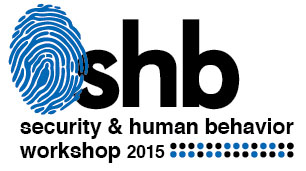June 8-9, 2015 |
PARTICIPANT LIST
Alessandro Acquisti, CMU: What Can Behavioral Economics Teach Us About Privacy?; Privacy and Human Behavior in the Age of InformationAndrew Adams, Meiji University:Facebook Code: Social Network Sites Platform Affordances and Privacy (OA Version); A Non-Militarised Approach to Cyber-Security.
Bonnie Anderson, Neurosecurity Lab, Brigham Young University: How Polymorphic Warnings Reduce Habituation in the Brain-Insights from an fMRI Study; Using Measures of Risk Perception to Predict Information Security Behavior: Insights from Electroencephalography (EEG); Using fMRI to Explain the Effect of Dual-Task Interference on Security Behavior
Ross Anderson, University of Cambridge: Book chapters on psychology and terror; It's the Anthropology, Stupid
Annie Anton, Georgia Tech
Bob Axelrod, University of Michigan
Lara Ballard, US State Department
Joe Bonneau, Stanford University
Laura Brandimarte, CMU
Bill Burns, Decision Research/CSUSM
Jon Callas, Silent Circle, Apple
Jean Camp, Indiana University
Peter Carnevale, University of Southern California
John Chuang, Berkeley: Security and Usability of Passthoughts; Your Thoughts are not My Thoughts; Synchronized Brainwave Recordings and Privacy; Government Surveillance
David Clark, MIT
Sunny Consolvo, Google
Matt Cronin, George Mason
Anthony De Tomaso, University of California Santa Barbara
Robin Dillon-Merrill, Georgetown University
Serge Egelman, Berkeley
Tom Finan, Department of Homeland Security
Vaibhav Garg, Visa
Jeff Hancock, Cornell
Alex Imas, Carnegie Mellon University
Richard John, University of Southern California
Karen Levy, NYU
David Modic, Cambridge University: Reading This May Harm Your Computer: The Psychology of Malware Warnings, We Will Make You Like Our Research: The Development of a Susceptibility-to-Persuasion Scale
Tyler Moore, Southern Methodist University
Arvind Narayanan, Princeton University Sandra Petronio, Indiana University: Regulating the Privacy of Confidentiality; Unpacking the Paradoxes of Privacy in CMC Relationships: The Challenges of Blogging and Relational Communication on the Internet
Angela Sasse, University College London: Not seeing the crime for the cameras?; The True Cost of Unusable Password Policies
Stuart Schechter, Microsoft: It's no secret; The Emperor's New Security Indicators
Bruce Schneier, Harvard
John Scott-Railton, UCLA
David L. Smith, University of New England: How does dehumanization work
Daniel Solove, George Washington University
Ashkan Soltani, Federal Trade Commission
Frank Stajano, University of Cambridge: Understanding scam victims: seven principles for systems security; It's the Anthropology, Stupid
Bob Sullivan, Journalist
Peter Swire, Georgia Institute of Technology: Re-Engineering The Mutual Legal Assistance Treaty Process
Catherine Tinsley, Georgetown
Catherine Tucker, MIT
Sophie Van der Zee, University of Cambridge
Anthony Vance, Neurosecurity Lab, Brigham Young University: How Polymorphic Warnings Reduce Habituation in the Brain-Insights from an fMRI Study; Using Measures of Risk Perception to Predict Information Security Behavior: Insights from Electroencephalography (EEG); Using fMRI to Explain the Effect of Dual-Task Interference on Security Behavior
Rick Wash, Michigan State University: Folk Models of Home Computer Security
Eric Wenger, Cisco



